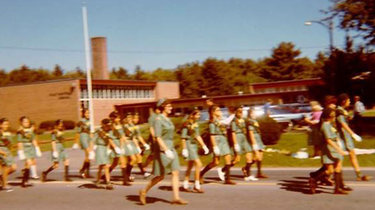Woman claiming sexual abuse by her sixth-grade teacher in the 1960s files against GCSD
GUILDERLAND — The school district and school board here were summoned with a complaint on June 28 with 20 days to answer.
The plaintiff, a 1974 Guilderland graduate, claims she was sexually abused as a sixth-grader by her teacher, Roderick Buckley. She told The Enterprise it made her lose her trust in teachers.
“This action alleges physical, psychological, and emotional injuries suffered as a result of conduct which would constitute a sexual offense on a minor …,” state the papers filed with Albany County Supreme Court.
The Enterprise withholds the names of victims of sexual offenses.
The incidents alleged in the court papers occurred over a half-century ago, and Guilderland school leaders who were at the helm in the 1960s have since retired or died.
The Guilderland alumna told The Enterprise that, a year ago, she was sitting around her sister’s pool with some friends when talk of Buckley came up. She learned that her sister, who is seven years older than she, as well as another friend at the gathering had suffered the same thing she had from Buckley as a sixth-grader at Fort Hunter Elementary School, she said.
“Oh, my gosh,” the alumna said, recalling her reaction upon learning she had not suffered alone as she’d thought.
“He would call us up to his desk at the front of the room,” she said, describing a big, gray metal desk. “All the girls wore dresses then. He would rub the back of your legs and up your bottom,” she said.” His hands did not go inside her underpants, she said, but stayed outside.
On Wednesday, the day after The Enterprise posted this story on its website, Leo Muzzy, who was two years ahead of the alumna, called to say he had seen, as a Fort Hunter student, the sort of abuse described by the alumna.
“I’m a witness who tried to do something to stop it,” said Muzzy.
He said he first heard about Buckley’s behavior as an 8-year-old when older boys were laughing about it in the boys’ bathroom saying, “Mr. Buckley feels up the girls.”
Muzzy also said of Buckley’s treatment of boys, “He used to beat the living hell out of us.”
When Muzzy got to sixth grade and had Buckley for a math teacher, he said that “two girls budding out early … growing breasts” were targets for Buckley.
He described a particular incident where Buckley handed out a 10-question math quiz and instructed the class, “Eyes down.”
Buckley then walked to one of the targeted girls “and hung all over her,” said Muzzy. “I can see her shoulders shaking; she’s sobbing,” he said as he re-lived the event. Muzzy tried to stop it, he said, and Buckley ordered him back to his desk.
Instead, Muzzy said, “I walked out of the room to the principal’s office.” The principal was Leonard Quint, who died in 2009 at the age of 78.
“I told him what was going on and Mr. Quint said it would be helpful if you’d get some girls to come forward,” Muzzy said.
The girls did not want to come forward, Muzzy said. “My father said to forget about it … I was trusting the adults .... I often wished I’d been older and knew to call a newspaper or a lawyer.”
What he did do is write up a petition describing Buckley’s behavior, and about 45 of his 60 schoolmates signed it, he said. Muzzy delivered it to the principal’s office.
The next day, Muzzy said, he was called to Quint’s office. “My mother was there, crying,” he said, and Muzzy was told this would go in his permanent record and follow him through high school.
“I was in trouble, not Mr. Buckley.” Muzzy said of the thrown-out petition, “I should have mimeographed it.”
Filing a complaint
In 2019, when the Child Victims Act was signed into law in New York, allowing children who were victimized to pursue court cases for long-ago crimes, the Guilderland alumna at first thought it applied just to priests in the Catholic church, she said.
When she learned it could apply to teachers in schools as well, she emailed a number of classmates, several of whom, she said, turned out to have had similar experiences with Buckley.
But they were not interested in joining her in the complaint, she said, telling her their lives had moved on. One friend, living in the western United States, said it had not affected her psychologically.
“How do you know if it affected you psychologically?” the alumna asked.
For her, the memories of Buckley were vivid enough that she wanted to pursue legal action, she said, hoping it would both alert the school to potential problems and also may make other women who had suffered as girls willing to come forward and to know they were not alone.
In 2019, Tod Mell, another Guilderland teacher, had been charged with endangering the welfare of a child, a misdemeanor, after he engaged “in unlawful physical contact” with a female juvenile at Lynnwood Elementary School eight years earlier, according to the complaint filed in Guilderland Town Court.
The victim in that case said in sworn testimony that Mell would slide his hand down to the place where her inner thigh met her vagina, and keep it there, rubbing and groping. He did this, outside of her clothes, as she stood next to him, behind his desk, at the front of the classroom, she said.
Mell struck a plea deal, pleading guilty, and was sentenced to two years’ probation. As part of his sentence, he had to surrender his teaching certificate and follow sex-offender conditions.
“You just hid everything”
“It could be a good lesson for schools,” the 1974 graduate said this week. “Nowadays I feel bad for the teachers … But in the fifties and sixties, they had so much authority, like the priests that were looked up to back then … A lot of these people got involved in professions where they could have access to kids.”
Also, before there were programs as there are now to teach children the difference between “good touch” and “bad touch,” she said, “As a kid, did you know if that really was wrong?”
The alumna was a student at Fort Hunter Elementary School on Carman Road in Guilderland where Buckley taught fifth and sixth grades in the 1950s, when the school first opened, and in the 1960s.
When enrollment dropped, after the baby boom generation had passed through, Fort Hunter was closed in the 1970s. The district sold the property. But, when the echo boom and suburban development caused enrollment to rebound, Pine Bush Elementary School was built nearby.
Altamont Enterprise archives contain news articles detailing Buckley’s leadership roles, as president of the Guilderland Teachers’ Association in 1953; as grade chairman in 1960, appointed by then-Superintendent Alton U. Farnsworth; and as being named to a committee in 1966, advised by the University at Albany, to study the characteristics of youth, aged 10 to 15.
The alumna recalled Buckley as being “very sweet to the girls and very, very mean to the boys; he would slam the boys around,” she said. “He would say, ‘I’m gonna cuff you’ and push the boys up against the lockers.”
She described Buckley as bald and big but added, “From a 10-year-old’s perspective, he was big to me.”
The treatment she received from Buckley, she said, “bothered me as far as not trusting teachers,” she said. The next year, when she got to Guilderland’s junior high school as a seventh-grader, she said, “I kind of rebelled toward authority and teachers.”
Asked if, as a 10-year-old, she had told anyone at the school, like another teacher or the principal, about Buckley’s behavior, she said, “No, I didn’t. You didn’t hear about stuff like that back then. You just hid everything.”
She said she cannot remember if she told her parents, both of whom are now deceased.
She related her feeling of dread as she sat in her sixth-grade classroom, “You didn’t want to be called up to that big metal desk,” she said. “No one could see what he was doing.”
District response
Guilderland schools Superintendent Marie Wiles confirmed on Tuesday that the district has received the notice of claim.
“These claims are very difficult to read,” she said. “Our work, above all else, is to make sure children are safe and feel safe. That is our obligation and our work.”
Wiles, who was hired as Guilderland’s superintendent in 2010, said the matter is currently in the hands of the district’s insurance carrier to find what it can from school district records. “I don’t know at this point if we have located anyone in a supervisory role back in the 1960s,” she said.
Of Buckley, she said, “I believe … he passed away a couple of years ago now.”
Wiles also said, “The notice of claim is written in very generic language. So it isn’t clear by reading it what exactly happened. I think it sounds honestly like you have a clearer understanding of these events,” she told The Enterprise.
Court papers
On Monday, the alumna said she hadn’t been aware that court papers had been filed until The Enterprise called. “I haven’t talked to the lawyers,” she said. “I filled all the papers out a year ago. Someone called me a month ago and said, ‘Can we use your name?’ I said, ‘Yes.’”
The court papers say that, in 1967 and 1968, when the plaintiff was 10 and 11 years old, Buckley “engaged in unpermitted sexual contact with Plaintiff,” describing her as “a minor and vulnerable child.”
The complaint also says, “Through her involvement and attendance at Fort Hunter Elementary School, Plaintiff developed great admiration, trust and respect for the school district, and came to know and trust Roderick Buckley as a teacher, mentor, agent of the district and authority figure.”
The court papers list four causes of action against the Guilderland school district and school board, stating that the defendants “breached their duty of care”; “were negligent in the hiring of their employees”; “were negligent in the training, supervision, and instruction of Roderick Buckley”; and “Negligently retained Roderick Buckley in a position where he had access to children and could foreseeably cause harm ….”
The court papers were filed by LaFave, Wein & Frament, an Albany firm, and by Jeff Anderson & Associates, a New York City firm.



